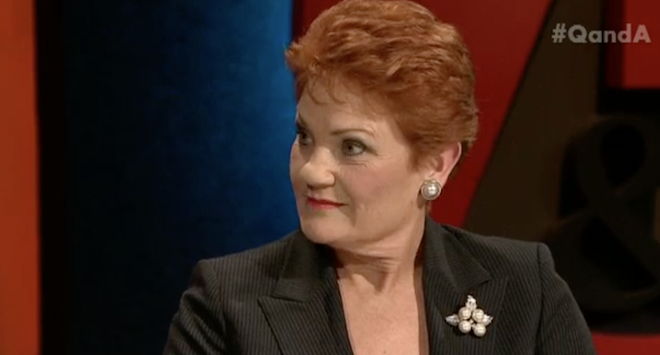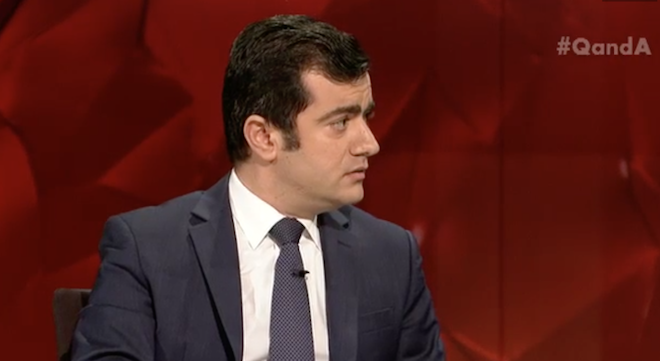Did Pauline Hanson’s Dumpster Fire Episode Of ‘Q&A’ Actually Achieve Anything?
Australian media have one hell of a Pauline problem.

It’s often said that the most constructive and interesting moments of Q&A are the ones without politicians. Think about this time a mathematician and a physicist excitedly debated the possibilities of time travel. Or the episode where a sex columnist, a gay rights activist and Germaine Greer gave considered discussion to polygamy and blowjobs with a conservative troll whose brain was ostensibly slowly dissolving through his ears.
At its best, the show is a public forum for people from diverse sections of society to grapple with complex yet important ideas which affect modern-day Australia (shh, okay not blowjobs, that was a bad example). At its worst, it’s a tired stage play in which politicians run familiar lines against one another and swiftly send the nation to sleep. Then, every so often, we get a Very Special Event like last night — a flaming dumpster fire in which Tony Jones has entirely contradictory and objectionable politicians battle to the death in his Thunderdome while some yell at the TV and others silently look on in well-warranted fear.
I can't deal with this. This is really painful. It hurts. I'm in tears. #QandA
— Mariam Veiszadeh (@MariamVeiszadeh) July 18, 2016
–
So, What Actually Happened?
This was a big week. Comprised of key figures of the new Australian Senate, the panel featured one representative from Liberal (Minister for Education Simon Birmingham), one Labor (Halal snack pack enthusiast Sam Dastyari), one Greens (the party’s Deputy Leader Larissa Waters), one Independent (Nick Xenophon), and a woman who bore a striking resemblance to that distant aunt who started a huge argument about climate change at Christmas lunch and refused to talk any further about it once family members started quoting facts at her.
As if there wouldn’t already be enough to talk about in the wake of an incredibly close and surprising election (and the volatile Senate this produced), the majority of the evening was dominated by talk of the gargantuan and wildly divisive topics of terrorism and Islamophobia. The show covered the recent Nice attack, radicalisation, the status of Islam as a religion, the perceived “threat” of Muslim Australians, and the now-infamous comments made by Sonia Kruger about a ban on Muslim immigration. Though there was some discussion of disillusionment with the two-party system and government spending towards the tail end, the night was ultimately Pauline’s. But not in the way she might have hoped.
Though this kind of focus on her far-right policies and concerns sounds like a blessing — it would have been unthinkable she would ever be given such a platform even just a few years ago — she did not use it well at all. Visibly nervous and often literally unable to string a full sentence together, Hanson was woefully out of her depth.
She stammered about Muslim countries not having democracy or free press to the point she nearly refused to acknowledge Indonesia was a country. She said all countries should be secular before incorrectly proclaiming Australia a Christian nation. Then, she nearly blew a fuse on national television upon finding out Sam Dastyari — who had asked her a poignant question about Muslim migration — had been born in an Islamic society.
Dastyari: When someone like Sonia Kruger goes on this morning and talks about banning Muslims from coming to the country… what they’re effectively saying is that people like my parents shouldn’t have been allowed to come to this country because of where they were born. It’s hurtful and it’s painful.
When I look at your policy document that says we should ban Muslims from coming to this country, I have to ask, does that mean that a five-year-old Sam Dastyari should have never been able to set foot in Australia because somewhere in Tehran there’s a document that says beside my name the word Muslim.
Hanson: Are you a Muslim? Really?

Dastyari: [stripped of the ability to form speech]

Hanson: Gee whiz.
Dastyari: I have never hidden away…
Hanson: So were you sworn in under *voice breaks* the Quran?
Dastyari: I was born in an Islamic nation…
Hanson: So you’re a Muslim.
Dastyari: Under Iranian law, under Islamic law… And my parents fled…
Hanson: And you’re a practicing Muslim. This is quite interesting. Are you a practicing Muslim?
For the record, Sam Dastyari is not a practicing Muslim. But then again, that’s not really a question he should have to answer on live national TV.
–
Did Any Good Come Out Of It?
Yes and no. On the one hand, this is the first time in recent memory Hanson’s had her views properly held to account in a public setting. Her most recent ascension to power has been fuelled by three-minute spots on shows like Sunrise — the kind in which they ask for her take on a world event spectacularly out of her expertise, she delivers an offensive answer and is cut off, controversy ensues, and the whole thing is repeated a week later.
Devoting the better part of an hour to interrogating her policy and worldview sounds gratuitous considering the fact she represents such a minor party, but there can be value to it. It’s important that her supporters see just how dangerously uninformed she actually is on the issues she chooses to champion.
gotta give pauline hanson credit, few party leaders have the courage to go on television and cast doubt over the existence of indonesia.
— Colley (@JamColley) July 18, 2016
The other refreshing thing about the episode came from the audience (as it often does). Though it’s common knowledge that Hanson’s vitriol not only offends but affects a great number of Australians, they’re not often given the platform to provide a counter-argument and have their experience heard. Last night, four Muslim Australians were given the opportunity to pose their pointed questions to the Senator and they did not disappoint.
“You have called for a Royal Commission into Islam to determine whether Islam is a religion or a political ideology,” one woman asked. “Can you please explain what constitutes a religion, and why Judaism and Christianity fall under the banner of ‘religions’, even though Islam, Judaism and Christianity all stem from the Abrahamic faith?”
“Senator Hanson, my 11-year-old son, who is watching this program right now, recently asked me ‘what is Islamophobia?'” a man asked later on. “Rather than explaining it to him with my own words, he and I sat side by side and watched a few of your past and current videos. Then I asked him what do you think Islamophobia is? His response was ‘someone that hates us?’…. I said Islamophobia is one or a combination of the three things hate, fear or ignorance.
“I promised him that I will ask you this question so he can hear your answer directly. So, with all due respect, what is the basis of your Islamophobic feelings? Hate, fear or ignorance?”
With all due respect @PaulineHansonOz, what is basis of your islamophobic feelings? Hate, Fear or Ignorance? #QandA https://t.co/BjSjuzVf13
— ABC Q&A (@QandA) July 18, 2016
As important and affecting as that experience is, that same man also spoke about how Hanson’s resurgence in public debate (like this?) has provoked a torrent of daily abuse in his own life. He’s not the only one.
I'm not going anywhere, Brad.
Thanks #PaulineHanson #QandA #auspol pic.twitter.com/aCxKSCT4KA
— Mariam Veiszadeh (@MariamVeiszadeh) July 18, 2016
It’s not for me, a white non-religious woman, to say if giving her this kind of dedicated platform and debate is worth the inevitable cost.
–
How Do We Deal With Pauline From Here?
No matter what you thought of last night’s show, one thing is clear: Australian media has a Pauline problem. Should we raise her up only to bring her down? Does it even matter if she humiliates herself? Maybe we establish standard practices of calling her a bigot or a racist like many in the US did for Donald Trump? It’s not like that worked out for them. Is it best to ignore her outright?
Though it might seem easiest, the latter isn’t the way to go. As Nick Xenophon made a point of mentioning last night, Pauline Hanson has every right to be heard — she’s now a representative of (at least some) Australian people. It’s important to address and interrogate the things she (and by association, they) stand for. But, just like your angry aunt at Christmas lunch, we need to make sure she doesn’t dominate too much of the conversation and that there are always some extra seats at the table.
tfw Pauline Hanson explains Islam to you #qanda pic.twitter.com/Frcspl5wU9
— Lane Sainty (@lanesainty) July 18, 2016


